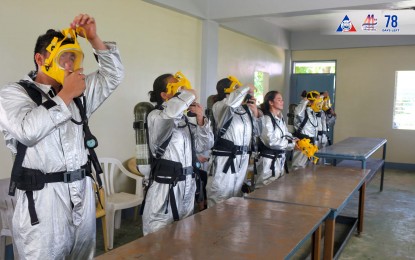
(File photo)
MANILA – To support the maritime industry, an official of the Department of Migrant Workers (DMW) on Thursday proposed the creation of a comprehensive tripartite program to boost the Philippines' competitiveness as the world’s best source of maritime workers and officers.
DMW Assistant Secretary Jerome Pampolina made the recommendation during the briefing of the House Committee on Overseas Workers Affairs on the country’s compliance with the Standards of Training, Certification, and Watchkeeping (STCW) for Seafarers, particularly those identified by the European Maritime Safety Agency (EMSA).
Pampolina reported that the EMSA found 13 shortcomings and 23 grievances, among which are the lack of training equipment and inconsistencies in teaching and assessment, adding that this is the final year for the Philippines to address deficiencies in the country's seafarers’ education, training, and certification system.
"The country has not been able to pass the EMSA Audit since 2006 or for more than a decade. This is the final year for the Philippines to adopt corrective measures towards full compliance," he said.
Pampolina warned that if the recognition of Philippine-issued STCW certificates is withdrawn, the country will undergo a new round of evaluation and must satisfactorily comply with the findings before the recognition is restored.
This means that Filipino officers and ratings will no longer be qualified to be deployed in European Union (EU)-plying vessels which require such certifications, he noted.
Pampolina cited the EMSA Outlook for 2020 stating that the Philippines leads non-EU countries with the most seafarer officers working in EU-flagged vessels with a total of 30,615, while data from the Maritime Industry Authority (MARINA) shows a total of 50,000 Filipino seafarers.
"It's possible for the Filipino seafarers to lose their jobs if recognition of Philippine-issued STCW certificates are removed. But this is just the direct effect. It may create a contagion among ship owning countries worldwide," he said.
He also cited data from the Bangko Sentral ng Pilipinas showing that overseas Filipino workers (OFWs) cash remittances from all sea-based OFWs during a five-year period averaged a total of USD6.375 billion.
Pampolina said this amount of remittances is also at risk should the country fail to meet minimum global standards of maritime education, training and certification.
He also warned about loss of jobs in the seafaring and manning industries and other related industries.
Aside from the tripartite program, Pampolina also proposed that the DMW, MARINA, Commission on Higher Education (CHED), Department of Transportation, and Department of Foreign Affairs (DFA) collaborate to address any issues and concerns in the Philippine compliance with the STCW requirements.
He also proposed to continue the ongoing discussions with maritime stakeholders to conduct contingency planning in the event of an unfavorable EU decision, as well as collaborate with the joint manning group (JMG) and shipowners to communicate to the EU the positive steps being undertaken towards compliance.
Committee chair Ron Salo said around 40,000 to 50,000 Filipino seafarers working on European vessels are endangered of losing their certification by the EMSA because of the inability of the concerned Philippines agencies to implement reforms, stressing that is high time for the country to comply with the requirements.
“It is high time that we take compliance with the STCW Convention seriously, as this will ultimately cost the livelihood of thousands of our Filipino seafarers,” Salo said.
DFA Undersecretary Eduardo de Vega, meanwhile, assured that they have been closely coordinating with EU member states to facilitate the discussion of STCW compliance with the EMSA.
The DFA committed to continue to use diplomatic tools to defend the country's STCW status.
“We always present to the EU how important and competent our seafarers are, and that it is a mutually beneficial matter for us to be certified. We also discuss this with the European maritime companies because they want to continue hiring Filipino seafarers," de Vega said.
The CHED, on the other hand, highlighted the solution of imposing a 5-year moratorium on the opening of new marine transportation and marine engineering programs and the institutionalization of national maritime admission examinations, and the phasing out of non-compliant programs. (PNA)
